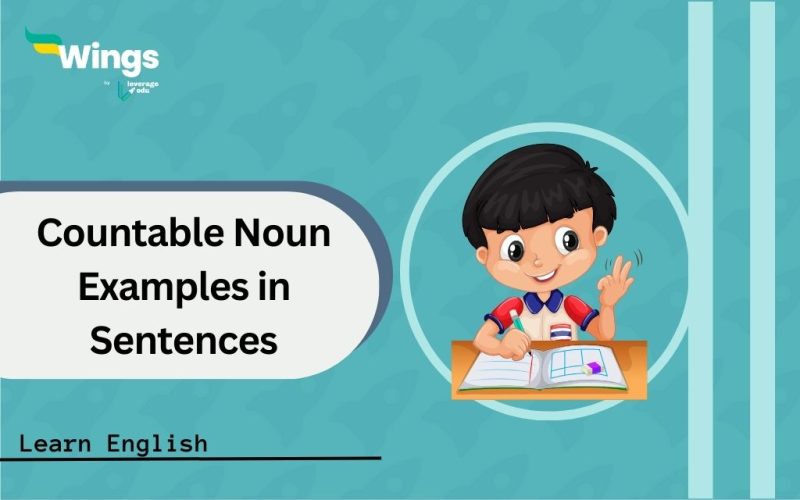Have you ever wondered why you can say “one apple” but not “one happiness”? It is all about countable nouns, one of the many types of nouns that describe things we can count one by one. But, these are often confused with their counterpart called uncountable nouns in terms of usage. Therefore, let’s hop on and read this blog on countable noun examples in sentences. So that the next time you encounter words like apple, happiness, or coin, you can categorise them as countable and uncountable nouns accurately.
This Blog Includes:
Must Read: Nouns: Examples, Definition, Types
What is a Countable Noun?
Imagine a pirate counting his treasure chest overflowing with gold coins. Those coins are countable nouns. They are words for things we can count, like stars in the sky, cookies in a jar, or even jokes shared with friends. Each one is distinct and separate, just like those shiny pirate coins.

Read More: Countable and Uncountable Nouns
Top 10 Countable Noun Examples in Your Surroundings
Now, let’s explore a few common examples of a countable noun in your living space or surroundings.
Do Check Out: 25 Examples of Abstract Nouns in Sentences
15+ Countable Noun Examples in Sentences
Next, you should learn how to use the above-mentioned countable noun examples in sentences through the following instances:
| S.No. | Countable Nouns | Example Sentences |
| 1. | Students | The excited students raised their hands with the answer. |
| 2. | Apple | I have three apples in my bag. |
| 3. | Dog | Sarah owns five dogs, each with a unique personality. |
| 4. | Chair | There are twelve chairs around the dining table. |
| 5. | Invitation | He received two invitations to the party. |
| 6. | Pen | The store sells various types of pens. |
| 7. | Season | There are four seasons in a year: spring, summer, autumn, and winter. |
| 8. | Elephant | The powerful elephant trumpeted with joy. |
| 9. | Balloon | She has seven colourful balloons for the party. |
| 10. | Student, worksheet | The teacher gave each student a worksheet to complete. |
| 11. | Flavour | The company produces five different flavours of ice cream. |
| 12. | Pumpkin | The farmer harvested ten pumpkins from the field. |
| 13. | Rainbow | A vibrant rainbow appeared after the rain. |
| 14. | Book | My brother bought three books from the bookstore. |
| 15. | House | The cosy house was filled with laughter and warmth. |
| 16. | Tree | The tall trees cast long shadows in the mysterious forest. |
Explore more reads on nouns below!
| Common Noun | 11 Examples of Common Nouns |
| Singular vs. Plural Nouns | Plural Nouns |
| Collective Nouns | Compound Nouns |
| What are Material Nouns? | What are Possessive Nouns? |
FAQs
What are countable nouns, and how are they different from uncountable nouns? Countable nouns are things you can count. They have a singular and a plural form (e.g., one cat, two cats). Uncountable nouns, on the other hand, are things you can’t count individually (e.g., water, air, sand). You wouldn’t say “one water” or “two airs.” Instead, you’d say “a glass of water” or “some air.”
Here are a few:
“I have three books on my shelf.”
“She bought a new dress for the party.”
“There are many trees in the park.”
“He asked several difficult questions.”
“We saw five birds flying overhead.”
Yes, generally. If a noun has a plural form (even if it’s irregular like “child/children” or “mouse/mice”), it is considered countable. The ability to make it plural indicates it can be counted.
While most are straightforward, some can be tricky. For example, “furniture” is uncountable in English, even though you can count individual pieces of furniture (chairs, tables, sofas – which are countable). Similarly, “information” is uncountable, but you can count “pieces of information” or “bits of information.” “Money” is uncountable, but specific currencies like “dollars,” “euros,” or “pounds” are countable. It’s always a good idea to check a dictionary if you’re unsure.
This was all about the examples of countable nouns in sentences. Hope you understand the concept and know how to proceed. You can also follow Leverage Edu for more exciting and informative blogs.


 One app for all your study abroad needs
One app for all your study abroad needs












 60,000+ students trusted us with their dreams. Take the first step today!
60,000+ students trusted us with their dreams. Take the first step today!